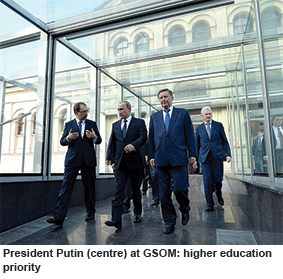 The new campus of Saint Petersburg State University’s Graduate School of Management (GSOM) provides quite an effective exemplar of Russian higher education today. Mikhailovskaya Dacha, the site of the summer residence of Grand Duke Mikhail Romanov, was given to the school as part of the Russian government’s 2005 National Priority Project in Education, aimed at creating two leading business schools in Russia.
The new campus of Saint Petersburg State University’s Graduate School of Management (GSOM) provides quite an effective exemplar of Russian higher education today. Mikhailovskaya Dacha, the site of the summer residence of Grand Duke Mikhail Romanov, was given to the school as part of the Russian government’s 2005 National Priority Project in Education, aimed at creating two leading business schools in Russia.
The journey to the finished campus, which opened in September, has involved renovation, reconstruction and the construction of new buildings. There have also been visits from Vladimir Putin, the Russian president. The main academic building — formerly Mikhailovskaya Dacha’s stables — is an imposing, expansive teaching space that can house over 2,100 students.
“We want to be internationally recognised, not just in the academic community but in the broadest sense. That’s our goal, and I think pretty much the same goal (for) the university and many other universities. That’s the Russian direction,” said Konstantin Krotov, managing director of GSOM, speaking to Times Higher Education.
Russia’s higher education sector as a whole is very much in the process of renovation. It has been only a couple of years since the introduction of Project 5-100, intended to propel at least five Russian universities into the Top 100 of leading global university rankings by 2020. Prof. Krotov says the initiative has helped a sector that “had not been developed for the past 15-20 years”.
“I’ve been in a couple of universities as a guest speaker (talking about) our experience,” he says. “They’re doing an amazing job right now. They develop so fast, they’re now much higher in the rankings.”
His effusive praise is not without validity. When THE published its BRICS & Emerging Economies Rankings 2016 on December 2, Russia was shown to be a star performer, with 15 institutions in the Top 200 and seven in the Top 50. Prof. Krotov emphasises that Russian universities’ mission isn’t just about their global position; institutions are well-integrated with their own communities.
Since some believe President Putin introduced support programmes for Russia’s universities because of the threat of a politicised student body, does he ever worry about government interference?
“No, no. We have academic freedom over here. We have these people on our academic staff not because they’re ministers but because they’re professionals in their fields. For example, the minister for transport became head of department first and then minister for transport. It’s because he’s a professional in his area. We were lucky to have him.”
And yet recent government actions have made Russia’s position in the global academy problematic. At the BRICS rankings launch, Anatoly Oleksiyenko, associate professor in the division of policy, administration and social sciences education at the University of Hong Kong, said Russia’s internationalisation efforts have been “compromised” by its “confrontational policies on the global political arena”.
“It’s hard for me to talk about (Russia’s position) in global higher education, but a lot of (attitudes) will be connected to our geopolitical situation,” Prof. Krotov says. “To be a leader in education, you should be open, transparent, attractive. Students come to places that are attractive, safe.”
(Excerpted and adapted from )